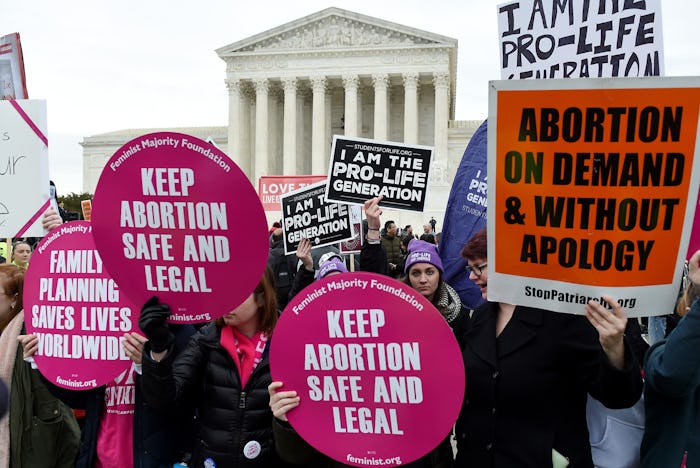News

Supreme Court Weighs Major Abortion Case That Could Have "Devastating" Consequences
The Supreme Court will begin hearing arguments Wednesday in the first major abortion case to come before the court since President Donald Trump nominated Justices Brett Kavanaugh and Neil Gorsuch. The case centers around a Louisiana law requiring doctors who perform abortions to have admitting privileges at a nearby hospital. While the Supreme Court's latest abortion case doesn't directly challenge the legality of abortion or Roe v. Wade, critics argue it could set a dangerous precedent for rolling back access to reproductive rights.
While the Supreme Court established people's legal right to abortion in the landmark case of Roe v. Wade in 1973, anti-abortion lawmakers in a handful of states have been busy passing restrictive abortion laws since Donald Trump's presidential election. For many, if not most anti-abortion lawmakers, the point of passing such laws was to erode abortion rights and access not just in their states but nationwide by providing the conservative Supreme Court justices Trump nominated with an opportunity to overturn the protections enshrined in Roe v. Wade.
If allowed to go into effect, Louisiana's 2014 law would force two of the state's three abortion clinics to close, lawyers for one of the plaintiffs, Hope Medical Group for Women, said, Reuters reported. The clinic has pushed back on state legislators' claims the law is meant to protect women's health and reproductive health advocates have argued it's an attempt to undermine abortion rights.
"Louisiana lawmakers have tried every which way to end abortion care in our state," Kathaleen Pittman, the clinic administrator at Hope Medical Group and lead plaintiff in the case, said in a statement shared by the Center for Reproductive Rights. "This law is one of many attempts to shut us down and prevent our patients from accessing abortion services." Pittman went on to say she was "optimistic" that the Supreme Court would recognize Louisiana's law as "an attempt to regulate abortion care out of existence."
"This law would be devastating for the women in our state and would no doubt have repercussions nationwide," Pittman said.
Research shows that people obtain abortions for a variety of reasons that can include finances, their health, or the interference a pregnancy or baby would have on their education, work, or care taking responsibilities. What's more, research from The Guttmacher Institute has shown that 24% of women in the United States will have had an abortion before the age of 45 and that 59% of women who obtain abortions are mothers.
Reproductive health care advocates have also called on the Supreme Court to strike down the Louisiana law as it did in 2016 with a similar case stemming from Texas. In a statement shared with Romper, NARAL Pro-Choice America President Ilyse Hogue argued that the Supreme Court "showed an alarming disregard for precedent" when it agreed to take up June v. Russo. Hogue said the case was "identical" to one that had been settled four years ago. "The only difference between now and then is that Trump has made good on his promise to stack the Court with jurists committed to ending Roe v. Wade, criminalizing abortion, and punishing women."
The nation's professional association of obstetricians and gynecologists has also voiced their opposition to Louisiana's law, noting that there is no medical justification behind abortion laws requiring admitting privileges. "Laws requiring physicians who provide abortions to have hospital admitting privileges are not medically justified," Dr. Maureen Phipps, CEO of the American College of Obstetricians and Gynecologists (ACOG), said in a statement shared with Romper. "Laws regulating abortion should be evidence-based and supported by a valid medical justification. This law is neither. We want the Supreme Court to understand there is no medical reason for this restriction and there is no patient safety benefit to this law."